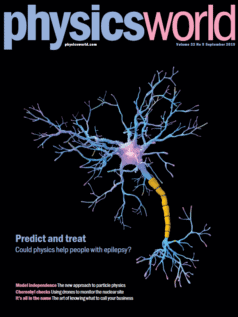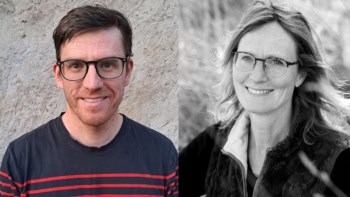
Could physics help people with epilepsy? That’s the question tackled by Louis Nemzer, a physicist at Nova Southeastern University, in the September 2019 issue of Physics World magazine, which is out now in print and digital formats.
He thinks that machine learning and real-time monitoring of the brain could give people with epilepsy live information about how much at risk they are of an imminent seizure – and is even developing a smartphone app to help them in daily life.
Elsewhere in the issue, Peter Martin and Tom Scott from the University of Bristol describe how they’ve used drones to map radiation levels at the Chernobyl plant (see video below), which you can also read on this website from 2 September, while Kate Brown from the Massachusetts Institute of Technology examines the health impact of Chernobyl fall-out.
And finally, don’t miss a great feature by Michela Massimi from the University of Edinburgh about how “model independence” could hold the answer to the deluge of data from current and future experiments in particle physics.
You can enjoy the entire September 2019 issue of Physics World magazine via our digital apps for iOS, Android and Web browsers (membership of the Institute of Physics required). Let us know what you think about the issue on Twitter, Facebook or by e-mailing us at pwld@ioppublishing.org.
For the record, here’s a full run-down of what’s in the issue.
• Disquiet over $3m supergravity prize – The decision to award a $3m Special Breakthrough Prize to three pioneers of the theory of “supergravity” has polarized opinion in the physics community, as Michael Banks reports
• Top Brazilian physicist quits after deforestation row – Data released earlier this month by INPE show that the overall devastation of the Amazon has increased by 68% between 2018 and 2019
• Ricardo Galvão resigns after Brazilian president – Jair Bolsonaro casts doubt on satellite data on Amazon deforestation rate, as Eduardo Campos Lima reports
• The personal impact of Mexico’s budget crisis – With Mexico’s new president making deep cuts to the country’s budget, including science, Fernando Fabián Rosales-Ortega – an astronomer from the National Institute for Astrophysics, Optics and Electronics – talks about how institutions are coping
• Supporting those in conflict – Kate Shaw, who has taught physics in several war-torn countries, says we must continue to support colleagues who work and study in such unimaginably difficult environments
• What’s in a name? – James McKenzie reflects on his recent experience of naming companies and explores what a minefield it is and (apparently) always has been
• Peering into the past – Robert P Crease talks to researchers in China who use physics-based techniques to understand the country’s history
• Glimpsing Chernobyl’s hidden hotspots – More than three decades after the world’s worst nuclear disaster at Chernobyl, Peter Martin and Tom Scott visit the exclusion zone surrounding the plant to map radiation levels using new drone-based technology
• Treating epilepsy with physics – Millions of people with epilepsy live in dread of unpredictable seizures from this medical condition. Louis Nemzer describes how novel approaches to predicting and treating these events are being developed thanks to advances in our understanding of the physics of the brain
• A relative revolution – Andrew Robinson reviews No Shadow of a Doubt: the 1919 Eclipse That Confirmed Einstein’s Theory of Relativity by Daniel Kennefick and Einstein’s War: How Relativity Triumphed Amid the Vicious Nationalism of World War I by Matthew Stanley and Proving Einstein Right: the Daring Expeditions That Changed How We Look at the Universe by S James Gates Jr and Cathie Pelletier and Einstein’s Wife: the Real Story of Mileva Einstein-Maric by Allen Esterson and
David C Cassidy, with contribution by Ruth Lewin Sime
• We shall inherit the Earth – Iain Dale-Trotter reviews Underland: a Deep Time Journey Robert Macfarlane
• Stepping stones into space – Libby Jackson, human exploration programme lead at the UK Space Agency, talks to Tushna Commissariat about taking chances, making bold choices, and finding her way into the space sector
• Once a physicist – Meet Chris Lucas is a research engineer in the AI research team at Babylon Health.
• The universe under a dome – Louisa Cockbill on the joys of teaching schoolchildren about science benath a giant inflatable planetarium



